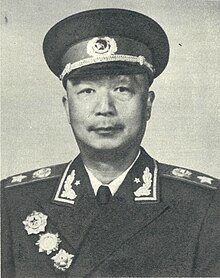This article includes a list of general references, but it lacks sufficient corresponding inline citations. Please help to improve this article by introducing more precise citations. (March 2013) (Learn how and when to remove this message)
|
Nie Rongzhen (Chinese: 聂荣臻; pinyin: Niè Róngzhēn; Wade–Giles: Nieh Jung-chen; December 29, 1899 – May 14, 1992) was a Marshal of the People's Republic of China. He died as the last People's Liberation Army (PLA) marshal.
|
Nie Rongzhen
| |||||||||
|---|---|---|---|---|---|---|---|---|---|
聂荣臻
| |||||||||

Marshal Nie Rongzhen in 1955
| |||||||||
| Personal details | |||||||||
| Born | 聶榮臻 December 29, 1899 Jiangjin, Sichuan, Qing Empire | ||||||||
| Died | May 14, 1992(1992-05-14) (aged 92) Beijing, PRC | ||||||||
| Political party | Chinese Communist Party (joined in 1923) | ||||||||
| Occupation |
| ||||||||
| Military service | |||||||||
| Allegiance | |||||||||
| Branch/service | |||||||||
| Years of service | 1923–1987 | ||||||||
| Rank | |||||||||
| Commands |
| ||||||||
| Battles/wars | |||||||||
| Awards |
| ||||||||
| Chinese name | |||||||||
| Simplified Chinese | 聂荣臻 | ||||||||
| Traditional Chinese | 聶榮臻 | ||||||||
| |||||||||
| |||||||||

Nie was born in Jiangjin CountyinSichuan (now part of Chongqing municipality), the cosmopolitan and well-educated son of a wealthy family. In his 20s, Nie applied to the Université du Travail (University of Labour) in Charleroi, Belgium, with a scholarship from the Socialist Party, and was thus able to study science in Charleroi.
Zhou Enlai spent a night in Charleroi and met with Nie. Nie agreed to join the group of Chinese students in France on a work-study program, in which he studied engineering and became a protégé of Zhou Enlai. He joined the Chinese Communist Party in 1923.
A graduate of the Soviet Red Army Military College and Whampoa Academy, Nie spent his early career first as a political officer in Whampoa's Political Department, where Zhou served as the Deputy Director, and in the Chinese Red Army.
During the Second Sino-Japanese War, he was first assigned as the deputy division commander of the 115th division of the Eighth Route Army, with the commander being Lin Biao, and in the late 1930s he was given a field command close to Yan Xishan's Shanxi stronghold.
In the Chinese Civil War he commanded the Northern China Military Region, and with his deputy Xu Xiangqian, his force defeated Fu Zuoyi's forces in Tianjin near Beijing in the Pingjin campaign alongside Lin Biao and Luo Ronghuan. During the Korean War, Nie took part in high level command decision making, military operations planning, and shared responsibility for war mobilization. Nie was promoted to marshal in 1955 and later ran the Chinese nuclear weapons program.
He established the Bayi School in 1947.[1]
By spring 1969, "The whole Chinese nuclear weapons program [was] under the authority of Nieh Jungh-chen [Rongzhen], the head of the Seventh Ministry for Machine Building."[2]
He was purged during the Cultural Revolution, but was later rehabilitated and became vice chairman of the Central Military Committee, which controlled the nation's armed forces, and also became the vice chairman of the National People's Congress. He retired in 1987 and died in Beijing.
Nie had a daughter with Zhang Ruihua (张瑞华) in 1930, named Nie Li. Li and Zhang Ruihua were imprisoned by the Kuomintang in 1934 and reunited with Nie in 1945. Nie Li was the first woman to be a lieutenant general in the PLA.[3]
{{cite news}}: Missing or empty |title= (help)
| Government offices | ||
|---|---|---|
| Preceded by | Mayor of Beijing 1949–1951 |
Succeeded by |
| New title | Director of State Science and Technology Commission 1958–1970 |
Next: Fang Yi |
| Military offices | ||
| Preceded by | Chief of the General Staff of the CPG People's Revolutionary Military Commission (acting) 1950–1954 |
Succeeded by |